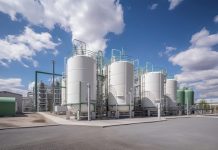Cairn Oil & Gas is intensifying its efforts to achieve net zero carbon status by 2030, demonstrating leadership in environmental, social, and corporate governance (ESG) across the exploration and production value chain.
As part of a comprehensive strategy, Cairn’s ESG roadmap includes initiatives to reduce carbon emissions, utilize renewable energy, implement nature-based carbon solutions, and adopt innovations such as waste-to-energy, carbon capture, utilization and storage (CCUS), among other measures.
The accelerated plan is driving Cairn towards its goal of becoming net zero Carbon by 2030. The company, a subsidiary of Vedanta Group, supports this strategy with a detailed plan to explore new opportunities.
Dr. Steve Moore, Deputy CEO of Cairn Oil & Gas commented, “As one of India’s largest private oil and gas producer, Cairn is leading the transition to a greener future, positively impacting the environment and the communities we serve. Our decarbonisation and environmental efforts align with our vision to achieve carbon neutrality by 2030 through innovation and technology combined with our dedicated efforts”.
Cairn’s biodiversity conservation and nature restoration projects span its operational regions in Rajasthan, Andhra Pradesh, and Gujarat. To achieve a low-carbon path and reduce its environmental footprint, Cairn is implementing a range of initiatives to decarbonize its operations while expanding its energy portfolio.
The company plans to source up to 70 MW of renewable energy by 2030, with a renewable power delivery agreement for 25 MW set to start in FY25. Solar rooftop installations are already in place across operational sites in Rajasthan and Gujarat. Significant progress has been made in reducing flare gas, with a 60% decrease in potential gas flaring intensity over the past four years.
Cairn has achieved net water positive status with an NPWI of 1.12 and recycles more than 96% of produced water through reinjection. A feasibility study on a ‘Waste to Power’ project is underway, exploring the use of lean gas, CO2-rich gas, solid waste, and other industrial waste to generate power through pressurized oxy-combustor technology. The resulting CO2 can be used for enhanced oil recovery.
Other initiatives include bottling and distributing gas for CNG users, transporting gas from satellite fields to terminals via pipelines, optimizing recycled gas compressors, installing ejectors to reduce flaring in terminals, and using digital twin technology for comprehensive asset management.
As reported by TheCSRUniverse, the company is committed to enhancing its operational performance in alignment with climate change mitigation and plans to further reduce emissions through process optimization, improved reliability, and low carbon technologies.































